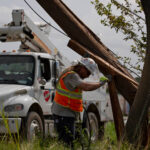I was recently chatting with a friend who specializes in science education when we touched upon a conundrum: Researchers who study climate change grasp the dire need to cut planet-warming carbon emissions that come from burning fossil fuels, yet many of them shrink from voicing their views at public events or to the press. The stock-in-trade of scientists is their objectivity, my friend explained. The worry is that advocating for an agenda may diminish their credibility, hurt their careers, and make them sitting ducks for political attacks online. But what are their moral obligations here? What should they do?

DILEMMAS:
Of science, ethics, and us.
Curious, I did some digging and queried a few experts and, well, the issues here are complicated. You’ve got a decades-old controversy over whether scientists should be advocates, and you’ve got climate change, a diffuse, slow moving, and highly politicized problem. To be sure, researchers should inform the public about what they’ve learned from their studies and suggest potential ways forward. But views differ on what, exactly, is the best way for them to make the case for action, particularly given the politics involved and what can seem like real reputational risks.
For one perspective, my friend pointed me to the work of philosopher and climate activist Kathleen Dean Moore, an emerita professor at Oregon State University. I looked up Moore’s poetic and poignant 2016 book, “Great Tide Rising: Towards Clarity and Moral Courage in a Time of Planetary Change,” which lays out razor-edged arguments for why climate change is a matter of moral urgency. Given the existential nature of its hazards, letting climate change proceed unchecked is a betrayal of the children who inherit the planetary mess we’ve made. It’s a gross human-rights violation, because poorer nations will suffer the most. The list goes on.
“If you have all the facts” — that is, the scientific consensus on climate change — “and if you have this moral affirmation of our duty, then you know what you ought to do,” Moore told me when I called her. “You know that it’s necessary for the government, everybody to take action.” And climate scientists bear a particular moral responsibility because “they know, more than anybody else, the dangers that we face,” she said. Backed by the authority of their science, “they have powerful voices if they would choose to use them.”
Moore writes in “Great Tide” that we’re in an “all hands on deck” crisis, yet most scientists have been “down in the hold, muzzled by the vague but real fear that if they speak out, they will be punished for ‘advocacy,’ the cardinal sin of science.”
At a meta-level, the philosopher’s call to action makes sense to me. As she says in her book, Bob Dylan’s lyrics got it straight: “What good am I if I know and don’t do / If I see and don’t say.”
Those lines reminded me of a different quotation that Gavin Schmidt, the director of NASA’s Goddard Institute for Space Studies and co-founder of the RealClimate blog, often cites in support of scientist advocacy. The quote, which first appeared in The New Yorker in 1986, comes from Nobel Laureate and climate chemistry researcher F. Sherwood Rowland: “What’s the use of having developed a science well enough to make predictions if, in the end, all we’re willing to do is stand around and wait for them to come true?”
In this sense, Schmidt told me, the real issue is not whether, but how to advocate for change in ways that are responsible — and that actually make a difference. For many scientists, there’s no bright line that divides advocacy from the public discussion of science.
Okay, so what’s a scientist supposed to do?
This is where Moore stakes out a more radical interpretation. In her ethical analysis, global warming is like a house on fire; we should throw all we’ve got at putting out the damn fire. Moore often cites a consensus report, signed by more than 500 scientists in 2013, warning that unless nations take immediate actions, the Earth’s life-support systems will most likely suffer irretrievable damage by the time today’s children reach middle age. That statement was important and courageous, and galvanized her own activism, she told me. But if climate change is a global emergency, just signing a letter isn’t enough. If the scientists really believed what they wrote, “they would be out on the street, demanding action,” Moore writes in “Great Tide.”
With Congress and the fossil fuel industry sitting on their hands, the philosopher believes that researchers (and the rest of us) should take a page from the civil rights movement. They could, for instance, march on academic campuses, calling for their universities to divest from fossil fuel corporations, she said, or demonstrate against oil pipeline projects (and get arrested) like James Hansen, the former head of NASA Goddard, has. Yet scientist-activists such as Hansen are the exceptions. The failure of many climate researchers to match their warnings about global warming with their actions is “the great moral hazard” that they face, Moore told me.
In other words, it’s a failure of integrity. Ouch.
But when I talked with Schmidt, he disagreed that political protest, or any other particular kinds of action, are necessarily the best or the only ways to act with integrity. It isn’t certain which forms of advocacy will truly spur societal movement on climate change. “It’s totally unclear what it is that any individual should be doing to make this a better world in the future,” he told me, his voice rising in intensity. How much does marching in protests move the needle? Is it more effective for climate scientists to talk directly to government decision-makers? There’s a range of possible actions that people can try, Schmidt said, and scientists act with integrity when, realizing they can’t do everything, they “decide what to do based on opportunity, effectiveness, and difficulty.”
The problem, he added, is that climate change isn’t an acute disaster scenario with black-and-white answers. The reality is bedeviled with grays. Yes, humanity needs to shift to cleaner energy systems, but it’s not as easy as immediately shutting down all consumption of fossil fuels, he said. Switching systems will have costs, too, and it’s uncertain which policy approaches — such as cap-and-trade? a carbon tax? — will be most effective. And since climate researchers usually aren’t experts on climate policy strategies, he noted, they’re less likely to advocate for a particular solution. They don’t want to be seen as irresponsible in weighing in on something they don’t know enough about.
In the current political climate, scientists may also see participation in public policy debates as a high-risk move. Some government climate scientists have been muzzled from speaking at conferences under the Trump administration, after all. And Moore told me of one climate researcher from overseas, currently working in the U.S. on a visa, who nixed an invitation to speak at a rally in support of science, for fear of being targeted for deportation. Other scientists worry — not without reason — that they could lose their research funding if they joined a divestment campaign, Moore said.
Of course, it’s hard to know the extent to which such potential threats are real. It’s also far from clear whether advocacy by scientists undercuts their public credibility, as feared; recent studies suggest that isn’t automatically the case. But the upshot of the perceived risks is a silencing effect. Like anyone else, researchers want to protect their jobs to support their families.
Still, the winds may be shifting. Simon Donner, a climatologist at the University of British Columbia in Vancouver, Canada, observes that a younger generation of climate researchers seems to be taking up the torch of advocacy, experimenting with social media, blogs, and other forms of public outreach. “We have people being really outspoken and not being shy about it,” he told me. “And Trump has helped make that happen, for sure.”
For climate researchers who wish to engage, but lack confidence in how to do so, Donner’s advice is to prepare well: First, figure out what you’re comfortable with — whether it’s speaking to community groups about research findings, supporting a divestment campaign, or writing op-eds in favor of, say, carbon tax legislation. Then, advocate responsibly by being clear when you’re reaching conclusions based more on personal values than on science, Donner said. Scientists should also consider who their audience is and read up on research about effective communication approaches. There are many books, guidelines and training programs to turn to.
For inspiration, would-be scientist-advocates might also look to Albert Einstein, who spoke out forcefully against the development of nuclear weapons. If the Nobel Prize-winning physicist hadn’t voiced his opinion, people might have thought less of him, Donner said — and the same goes for climate scientists now. “If you choose silence as an option, that can also reflect poorly on you.”
UPDATE: An earlier version of this column unintentionally associated the views of the scientist Gavin Schmidt with a more general observation about the perceived line between science and advocacy. The language has been modified to make clear the distinction.
Ingfei Chen is a California-based writer whose stories have appeared in publications including Scientific American, The New York Times, and Spectrum. She is a former Knight Science Journalism fellow at MIT.
Email us at [email protected] if you’d like to seek input on a quandary of your own. Undark will talk to experts on ethics, philosophy, or standards of ethical scientific or journalistic practice and share their best wisdom on possible solutions. For those wishing anonymity, we’ll withhold your name from any resulting Q&A items that we publish.











Comments are automatically closed one year after article publication. Archived comments are below.
Very first paragraph…….
The only evidence that I can find of scientists jeopardizing their careers is when they speak out in OPPOSITION to the so-called scientific consensus on the dangers of CO2 warming.
I don’t know who you people are and I don’t know why you live in a world so clearly the opposite of reality.
But I’m sick of it. The only climate scientists that I know of who’ve lost jobs and had their reputations destroyed weren’t advocating for climate action, but the exact opposite.
You People are despicable. On one hand you want to ignore the pushback against professionals who don’t go along with the current orthodoxy, on the other hand you want to pretend that YOU are the ones who are in danger of losing careers.
This is an excellent work. But according to the term “Karma” (that the actions of the organism, and the moral consequences that result from it). So why neglect the wave side, which is the most damaging cause of climate, especially human emission (infrasonic and electromagnetic waves resulting from our behavior and our diet), which contributes either positively or negatively to climate chemistry, and therefore, any work done by mankind will be saved as energy, and this energy is either useful or harmful, depends on the way we behave. For example of this is the bad climate of cities in some East Asian countries, whose populations eat meat of predatory and uncleanness animals. So we must first correct the course of our behaviors, through guiding communities about healthy foods and positive behaviors.
So if more than 500 scientists warned us in 2013 that unless nations take immediate actions, the Earth’s life-support systems will most likely suffer irretrievable damage by the time today’s children reach middle age, and those immediate actions clearly weren’t taken, where does that laeve us now?
Mr. Alastair L, the IPCC is NOT an advocacy organization; it is charged with gathering the latest information and organizing it into a coherent set of documents. It has been excoriated by climate science deniers who have made mountains out of minor errors. It focuses on “just the facts, ma’am”. Yes, they have often underestimated the magnitude of developing changes. I think this is appropriate because credibility requires conservative rigor. Advocacy is for other groups.
As to the “no one single event can be attributed to CC” matter, that was because nobody had developed a compelling attribution methodology until recently. The early efforts in this direction go back at least twenty years, and the idea of using climate models to statistically analyze scenarios is more than a decade old, but it wasn’t considered solid enough until just the last few years. Nowadays we’re seeing lots of these attribution studies showing up, all of them based on solid previous work. See, for example:
http://iopscience.iop.org/article/10.1088/1748-9326/aa9ef2
http://www.pnas.org/content/113/42/11770.short
https://journals.ametsoc.org/doi/pdf/10.1175/BAMS-ExplainingExtremeEvents2014.1
If they are going to join the discussion they need to do a much better job than the IPCC has. Professional reticence to say anything even remotely contentious (in a scientific sense not politically) meant that polar ice melt rates were massively under-projected for a decade. Also this “no one single event can be attributed to CC” stuff has to stop… I think the good ones should speak out, especially as their careers become more senior, but also younger scientists who will speak to their generation perhaps more effortlessly.
Thanks, Ms. Chen. I enjoyed the work you applied here and how you wove what you acquired into a cohesive fabric worth thinking more about over time. And the way it makes me look back at myself, too.
Pretty sure I read the above comments right. On a website dedicated to science and an article regarding the dilemma of advocacy a long-winded multi-comment complains of trolling and tells scientists to shut up. It would be ironic if it were written by a humorist. As uncomfortable as the name-calling may be (Nazi and “so-called ‘scientists'”, etc) it represents a rather outspoken demographic that you may find for example in your workplace. Thus, the tiresome and seemingly futile need to speak reasonably.
Regarding the comment, if “politicians are by definition .. propagandists”, then it could be accepted that legislation is secondary to propaganda. All the more reason for scientists to help lawmakers choose their propaganda wisely.
OK, Mr. McGrath, everybody is a propagandist. That includes you, of course. So why is it OK for you to engage in political advocacy but not OK for scientists to engage in political advocacy?
Once again you refer to “Marxist Climate Alarmists”. You offer not a shred of evidence to support your label, so I’m going to refer to you as a “Nazi Science Denier”. Fair enough? Or would you prefer “Fascist Science Denier”?
You claim that climate scientists have been advocating for “a massive carbon tax”. I challenge you to present a quotation from a reputable scientific organization advocating such a tax. You can find individuals, I’m sure, but I can just as easily present quotations from crazy individuals advocating all sorts of nonsense. Let’s see something from a reputable group, such as the NAS or the AAAS. Or, for that matter, from any of the several hundred reputable scientific organizations the world over that have published statements endorsing climate science. Here’s one such list:
http://www.opr.ca.gov/facts/list-of-scientific-organizations.html
Not a single reputable scientific organization has published a statement denying climate change science. Not one.
As for your other crazy statements, I challenge you to back them up with actual sources. Provide the quotation and the URL, please. Otherwise, I think it fair to dismiss your claims as ravings.
I’m with Chris Crawford here. I think we need multiple voices to know what’s “really going on here,” however. Old ideas like Capitalism and Marxism have contained MANY of the problems we face, but perhaps SOME of the solutions. Societies have, in the past, lived in more harmony with the earth, but perhaps not so much in western recorded history, and not under such a materialistic lifestyle. It REALLY comes down to a crisis of values. If we value material acquisition more than life itself, then we will get what we desire. We cannot any longer take ANYTHING for granted, such as air, food, water and land, nor the biology they support. Time to DITCH the “economic” dollar value of everything and quit ignoring “externalities.”
Mr. Crawford, advocating for a political agenda makes one a propagandist regardless of profession. So yes, it would apply to lawyers, dentists, carpenters, and scientists. Since politicians are by definition already propagandists that would be redundant. Perhaps Mr Crawford is not aware that AMAPAC and the NRA are PACs, that is what they do – advocate political issues. The American Bar Association, however, does not endorse candidates, make political contributions, or advocate for any political position, contrary to Mr. Crawford’s belief.
Mr. Crawford apparently prefers to pretend ignorance for all those years Marxist Climate Alarmists have been advocating, and continue to advocate for a massive carbon tax. It is has well been established that these fanatics want to tax all fossil fuel production into extinction and return humanity to the stone age. Furthermore, these Climate Alarmist extremists advocate killing all those who disagree with them. Sounds an awful lot like 1930s NAZI Germany to me. Let’s not forget that NAZIs were left-wing Marxist socialists fascists, just like the current batch of Climate Alarmist fanatics.
Mr. McGrath writes “Scientists who push an agenda are not scientists.” Why should not his dictum apply to lawyers, dentists, carpenters, politicians, or any citizens? Are scientists the only profession that should not advocate for political issues? Should the American Medical Association, the National Rifle Association, and the American Bar Association be dissuaded from advocating on political issues?
Mr. McGrath here advocates a political position; does that mean that he has lost all credibility?
I think not. However, his claims regarding climate science are absurd. No, scientists do NOT blame all humanity for the climate; they blame emissions of CO2 for slowly raising temperatures and thereby slowly changing climate.
No, their only solution is NOT to “massively increase the scope and size of government and to redistribute wealth through extensive taxation”. Indeed, among the many solutions offered, NONE of the sources I have seen suggest anything remotely like that.
Mr. McGrath’s final paragraph is a risible collection of rabid fantasies. If he wishes to have a rational discussion of the subject, I would be happy to explain what’s really going on here.
We’re all shocked that the word “commie” has fallen out of use in only a generation. Green Nazis united under the flag of 12 monkeys genocide have got to be communism. Right? Their drugged out EDM or rave music hippie commune version of nirvana is just an excuse to get drugged out and lay around helpless. We must increase energy to the wheels of our machine to stop them, the they that uses terms like ISIS and Taliban to describe themselves, meth addicts and all. Trump did stop ISIS in its tracks. He will also stop the green disease that is Nazi. Their leaders will fail and their masses will disorganize, mostly due to drug use. Trump has the power to change the world, putting the very bad people in prisons he will build all over the world, then on the moon for the very worst offenders. People on earth will get to the feel the security and safety of knowing the very bad people are far away and don’t know how to escape, operate spacecraft or their weapons systems. Watching them try to escape will be prime time TV. These new economies will create industries and provide jobs for many many people. Eventually corrections will be the entire economy. That is no BS.
“The worry is that advocating for an agenda may diminish their credibility, hurt their careers, and make them sitting ducks for political attacks online.” And they would be right to worry. Scientists who push an agenda are not scientists. They have become propagandists instead, and they do lose all credibility and rightfully so.
When you have idiots who blame all humanity for the climate on this planet, and then claim to be a “scientist” they are really nothing more than a troll. You will also notice that their ONLY solution is to massively increase the scope and size of government and to redistribute wealth through extensive taxation.
Why is it that Climate Change fanatics are always Marxist fascists? If they can’t come up with a better solution than depriving people of their livelihood and liberty then these so-called “scientists” need to shut their gob. Because no sane individual would willing be part of the NAZI world these Climate Alarmists want to create. We know they are just using Climate Change as a vehicle to push their Marxist fascist agenda, which is why nobody buys into their blatant BS.